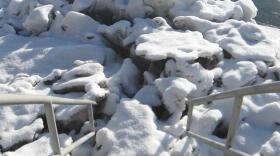It’s been a slow start to winter for snowmachining on the central Kenai Peninsula. There’s been plenty of cold the past month but snow accumulation has not followed in the biggest recreation areas for riders.
Northern areas of the Kenai National Wildlife Refuge where snowmachining is allowed opened Jan. 4. Snowmachining is open on the refuge north of the Kasilof River and Tustumena Lake, except for the usual areas that are always closed — the area around refuge headquarters in Soldotna, the Swan Lake and Swanson River canoe systems, all areas above timberline and the Skilak Wildlife Recreation Area, expect for accessing ice fishing on Hidden, Kelly, Petersen and Engineer lakes.
The southern part of the refuge remains closed. The Caribou Hills and the hundreds of miles of snowmachine trails between Clam Gulch and Homer are also not yet open for riding.
Tinker Anderson is president of the Caribou Hills Cabin Hoppers Association.
“The refuge called me here two weeks ago and we talked about it. There is some snow up there but not enough. And my thoughts are exactly, ‘Don’t open it until you have enough snow.’”
Refuge policy calls for 21 inches of snow before opening an area to snowmachinging to protect the vegetation below. While the Soldotna area got 6 inches in last week’s snowfall, Anderson only got about 2 inches at his place in the hills.
The Cabin Hoppers Association maintains 118 miles of trails in the Caribou Hills. And though they’ve been getting calls from people wondering when they’ll start grooming, Anderson says they’re holding off for more snow, even on trails outside the refuge boundary.
“Right now, there’s not enough snow for us to get our big cats out to do that because there’s a lot of rocks on the trails. We run over those with those grousers and when they break they’re $350 each.”
The Caribou Hills trails are open to lighter-impact uses, including dog-sleds, fat-tire biking, skiing and snowshoeing, but snowmachiners are still waiting.
At least, Anderson hopes they’re still waiting.
“Now, we have this group of people we call idiots. That will go ride there just because they can say, ‘Well, I rode in high country.’ Well, they don’t understand that they can ruin it for everybody else.”
The cabin hoppers are a user-supported organization with revenue coming from membership donations and fund-raiser events. The organization also gets funding through the state Department of Natural Resources, but that comes from snowmachine registration fees. Anderson wishes more riders understood that registration dollars going to the Department of Transportation actually end up going to the 16 trail grooming organizations around the state.
“And people are not registering their machines. So, therefore, the money’s going down and you can’t get very much money when there’s not much there. So if they want better services, maybe they want to pay their snowmobile registration.”
More information on the Cabin Hoppers Association can be found on their Facebook page and their website, akchch.org.





